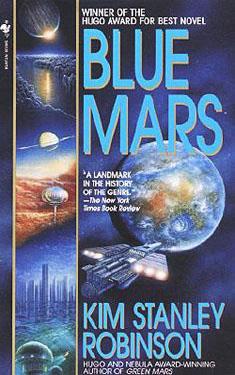Kim Stanley Robinson
Competed 1/1/2013, Reviewed 1/1/2013
4 stars
Finally, I’m done with the Robinson’s Mars Trilogy. It was a very long journey. After being rather nonplussed with Green
Mars, I wasn’t expecting much from Blue Mars.
It’s longer than the first two installments, and still full of extremely
long landscape, technical, and political ramblings, or rather, prose. And besides, what else can you say about Mars
now that it’s terraformed, a government is established, and people are living
to be over two hundred years old? As it
turns out, not that much. But you can
finally really rely on slices of life of your characters to create something
like a collection of inter-related short stories to convey the experience of
living on Mars.
I don’t know if it’s because I finally gave into the
trilogy’s form, or Robinson’s style just grew on me over the course of the
trilogy, or if in the starting of this book I was feeling sentimental, like I
was visiting old friends, but I felt that Blue Mars was a better character
driven novel than the first two. There
is still a lot of prose during which I again found myself losing focus, but I
found myself more in touch with the characters than I had in any of the other
stories. They really seemed to have depth. They no longer existed simply to convey the
author’s knowledge of the landscape, neuroscience, global eco-politics, and
math. The author’s knowledge existed to
bring you fully developed characters.
Again, each chapter represents the voice of one
character. There isn’t as much of a plot
this time. So each chapter feels more
like a short story in the same universe, rather that a single part of one
novel. And instead of being sad at the
end of each chapter, I was looking forward to the being in the next character’s
shoes. Each character finally got to
just experience their lives and figure out what to do with themselves now that
most of the crises were over, and each one was interesting, and often downright
intriguing. My favorite characters, Maya
and Sax, are featured and I found myself finally warming up to Nadia, Nirgal,
and Ann.
One of the sections I really enjoyed was where a few of the
Martians go to Earth to work on a treaty.
Nirgal, a native born Martian, has to adjust to Earth’s gravity for the
first time and becomes the toast of Earth.
Michel, one of the first hundred, struggles with his homesickness for Provence , France . I also really enjoyed the chapter describing
colonization on other planets and moons.
The most profound part for me, though, was the remaining
first hundred finally dealing with the possibility of death. Having found a formula for extending life and
postponing the problems with aging, the group is now over 200 years old, and
people are beginning to die and there’s no explanation. Maybe it’s because I’m a person of a certain
age and often think about my mortality, but these chapters really moved
me. It was here that I confirmed my
sense that I really had come to love these characters.
My only criticism is the same old one. The descriptions go into so much detail, that
it becomes overwhelming. My eyes often
glazed over during the long descriptions where a paragraph was two or three
pages long, with only two or three sentences per page. During my glazing, I often imagined Robinson
at his computer pounding away at the keys in a trance, forgetting to eat,
drink, or go to the bathroom, or on his phone threatening his editor with
torture and mutilation if one word of his text was deleted.
I give this book 4 stars, even though I’d rather the editor
was much more aggressive. It’s an
incredibly long, painstaking effort to get through this trilogy, but depth of
the characters in this final installment made the payoff worthwhile.

No comments:
Post a Comment